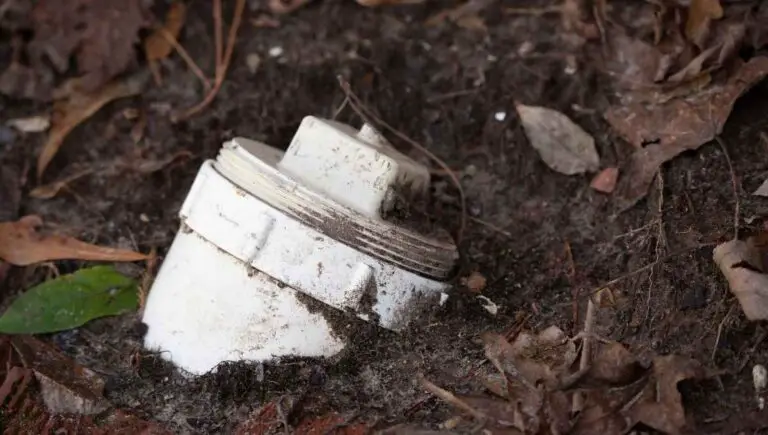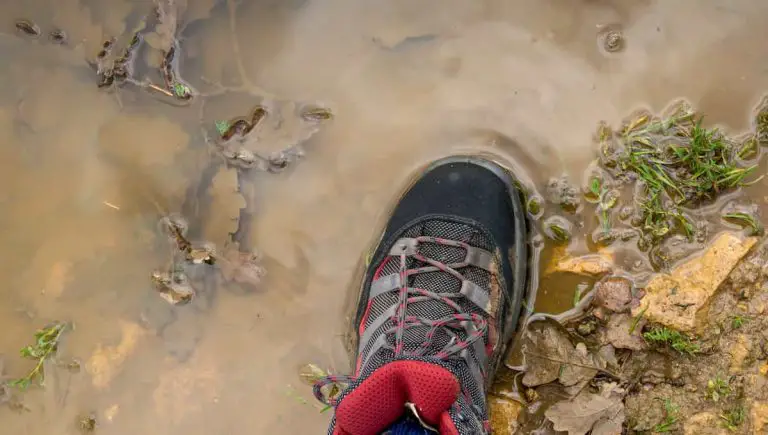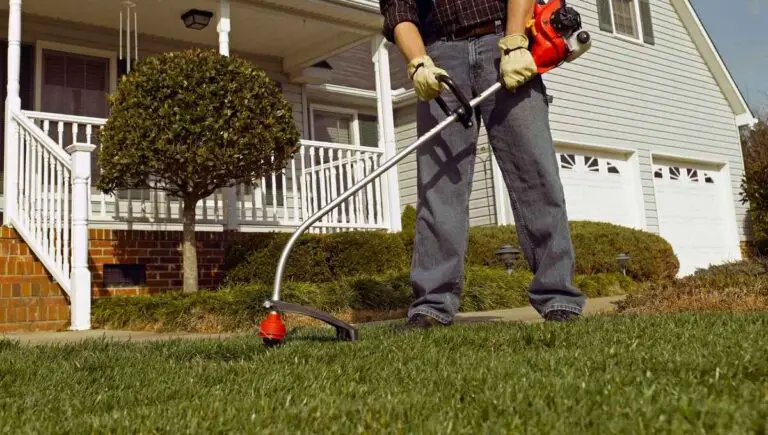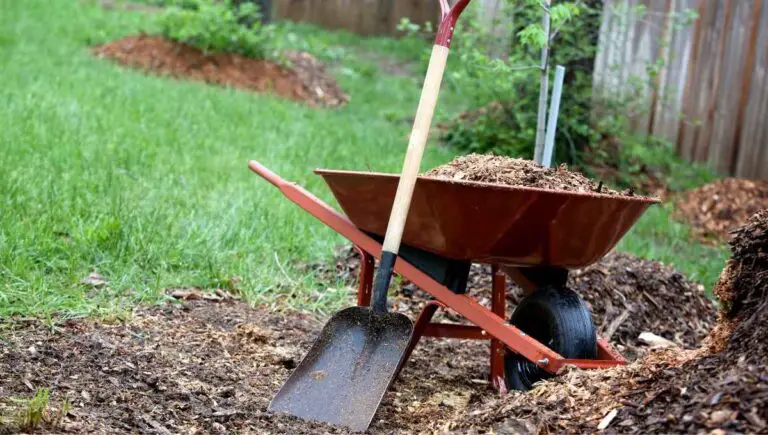Can You Bury an Extension Cord? (Quick and Easy Approach)
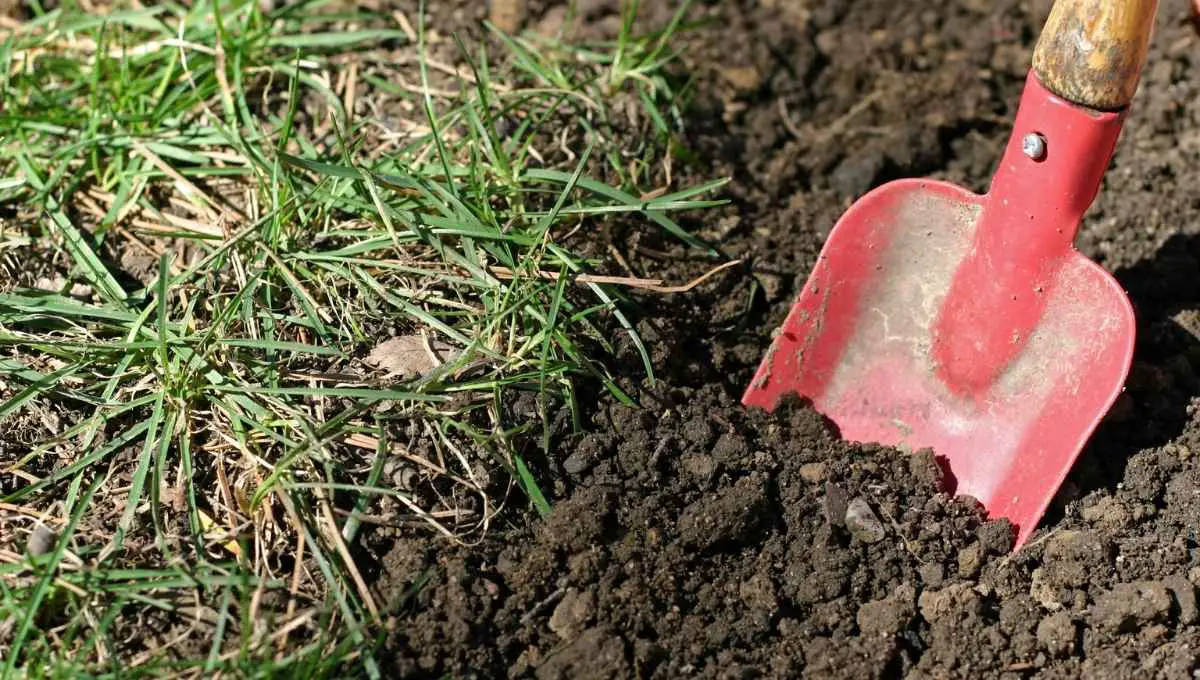
Deciding to bury an extension cord is a great way to maintain the peaceful aesthetics of your yard while also being able to power up your outdoor appliances. However, if you bury your extension cord the wrong way, you may suffer unwanted consequences.
Burying an extension cord is possible as long as it is meant for direct-burial purposes. It also needs to be buried correctly according to the extension cord type and follow all the safety standards established by the National Electric Codes.
If you don’t keep these criteria in mind, many accidents can happen, and nobody can afford to have that happen.
So, in this article, we’ll discuss all things about burying extension cords, how you can do it, and how to determine if an extension cord is fit for outdoor purposes.
This post contains affiliate links from Amazon and other stores. This means Yard Blogger may earn a commission if you make a purchase using any of our links. Please refer to our full affiliate disclosure policy for full details.
Here’s a Quick Pro Tip!
It’s possible to bury extension cords, but not all of them are meant for this purpose. Usually, the type of extension cord you’ll need is a UF-B cable that can be buried directly on the ground without any further issue.
However, to properly bury your extension cord, you also need these valuable tools for your next electric project:
1. UF-B Cord – Bury this cord directly on the ground without feeling guilty. This cord is meant to withstand the present conditions underground to protect the wires from external elements.
2. Shovel with Adjustable Handle – If you can’t afford a digging machine, you still need to use something to dig up that trench. So, you can try using this shovel. It even has an adjustable handle.
3. “Electrine Line Below” Caution Tape – You need to let future inspectors know there is a wire underneath. Not doing so can result in many misunderstandings and unnecessary incidents! Let them know by using this caution tape.
Understanding Direct-Burial Extension Cords
Before we begin discussing how to install an extension cord underground, you need to learn about the types of extension cords and the benefits they can offer your outdoor space. So, let’s look at them below!
Can I Bury an Extension Cord Underground?
Burying an extension cord is possible, but many recommend avoiding it. Although doing it aids in keeping outdoor electrical appliances working, not burying them correctly can pose a threat that can cause many accidents, including fires.
Therefore, you should know the basics about your current extension cord. For example, is your cord meant for outdoor or indoor use?
Additionally, before you bury an extension cord underground, it’s recommended that you learn the essentials about your cord.
Finally, you should look at the National Electric Codes (or NEC), which will tell you the right way to bury it.
Even then, if you’re not truly sure about the best approach to take for you to do it without any mistakes, you should hire an expert electrician that can guide you in the process.
As a side note, burying it directly without protection is hazardous and illegal.
Is There an Extension Cord That Can Be Buried?
There are extension cords that can be buried underground. These are classified as UF or USE cords; some can even be buried underground without needing a conduit. But be cautious, as not all of them are equipped for inside and outside wiring.
Generally, buriable cords are known as direct-burial extension cords. As the name states, they are meant to be buried in the ground without causing any issues.
There are many types out there, but the most used is UF-B because the NEC allows its use for sourcing power from internal to external connections.
Other types include UF and USE-2, but they are typically used for harder projects rather than simply keeping external appliances working.
So, before installing wiring on your patio, make sure to understand the difference between all your options.
What Kind of Electrical Wire Can I Bury?
You can bury a type of electrical wire that is named UF-B. This type of electrical wire is made to source power from the inside of a structure (in this case, your home) to the outside (your yard). Additionally, it won’t always need a conduit.
A UF-B has its cables enclosed in thermoplastic protection that allows it to withstand the conditions to which it will be exposed underground.
Therefore, you can bury it directly without any fear of risk, so long as you follow the NEC codes and guidelines.
However, you can use a conduit if you believe this is safer for your situation. But, make sure to check the guidelines and the laws that apply to your state or county since there could be other regulations to follow.
Are There Outdoor Extension Cords?
They make outdoor extension cords designed to resist outside temperatures. These cords are often used for external purposes, such as powering outdoor lights. However, according to the NEC’s regulations, they’re not meant to be used as a form of permanent wiring.
These types of extension cords usually come in orange color.
Someone who has gone to kid’s birthday parties probably has seen them since parents often use them to power up the bounce house to keep it inflated and functioning.
Are Orange Extension Cords Waterproof?
Some orange extension cords are waterproof, but others aren’t. Therefore, you should always look for an indicator that lets you know they are water-resistant if you aim to use them for water activities. You can find this on their label or on the unit itself.
To check whether your extension cord is waterproof or not, check the unit and look for the letter “W.” This letter lets you know that it’s water-resistant, so it should resist most damping situations.
However, just because it’s waterproof doesn’t mean you should soak them in water or expose them to flooding.
Doing this is very dangerous and could cause someone to suffer from electrocution, which would be very unfortunate.
What Kind of Electrical Wire Can Be Buried Underground Without Conduit?
The kind of electrical wire that can be buried underground without needing a conduit is a UF-B, a direct-burial wire that comes with proper insulation and does not need extra protection.
Since it’s already protected, it doesn’t need a conduit. However, many prefer to add it anyway for mental peace, and we truly can’t blame them. Electricity is not something one should take lightly!
What Is Code for Buried Electrical Wires?
Codes for buried electrical wires regulate how direct-burial cables are meant to be concealed according to the circumstances, the voltage, and the type of direct-burial wire. The NEC establishes these codes to ensure the safety of energy consumers.
Here are some basics about buried electrical wires:
- According to the NEC, wires that don’t use more than 30 volts must be buried at least six inches deep within the ground.
- You must protect some UF cables with a conduit if they go above the ground.
- UF cables that need the assistance of conduit only need to be buried 18 inches deep. However, UF cables that don’t need it must be buried 24 inches deep.
- It’s best to choose a PVC conduit since it will resist most weather circumstances that may affect the soil.
- Most state laws require you to call electric experts or inspectors before beginning any project. This is to ensure your and your household’s safety.
Can I Bury an Extension Cord Inside a Pvc Pipe?
You can bury an extension cord inside a PVC pipe to use it as a conduit. A conduit is meant to protect the cables and wiring from external elements, such as water, heat, and other natural phenomena that can cause potential damage to your house.
PVC piping can be used for the conduit, which is likely the best option since it protects the wiring better than copper or other materials. So, it’s better to use PVC piping to avoid other issues.
You might also enjoy our post on If You Can Leave a Fridge Outside
Can You Bury an RV Extension Cord?
Burying an RV extension cord is possible, but many strongly advise against it. Generally, RVs are used for road trips, so burying them won’t be much of a good option if you plan on moving constantly, and it is likely to become a burden.
Additionally, extension cords for RVs shouldn’t be used as permanent wiring. Thus, most RV experts recommend that you only use the cords when absolutely necessary and not nonchalantly.
How to Bury an Electrical Cord
Knowing the codes about direct-burial extension cords is important, but now you’ve got to dig into how to bury it according to the type and protection it needs.
So first, let’s look at how to bury an extension cord according to the general rulings of the NEC.
How Do You Run an Electrical Cord Underground?
You have to call your local electric inspectors before running an electrical cord underground. Then, you should mark down the path where you want to run the extension cord. It should go into a straight path for ease of access.
Here is a step-by-step guide on how to run an underground electrical cord:
- Depending on your type of cord, or if it’s going to run with a conduit, you will need to dig the path with a trenching machine or shovel at least 18 to 24 inches deep. Be sure to follow all NEC guidelines!
- Next, make sure the wires fit the trench you dug. An inspector can tell you if the trench you dug is deep enough and compliant with necessary regulations and local laws.
- Then, after digging and making sure the wires are fitted and connected perfectly to the energy source, you should fill the trench with sand. On top of that sand, there should be caution tape. Both will work together to notify future inspectors in case another project arises.
- Finally, you close the trench by covering it up with soil. Remember always to consider the opinion of electric inspectors for safety.
How Can I Hide My Outdoor Extension Cords?
You can hide outdoor extension cords using things like cord covers or cord concealing kits, so long as you follow the NEC guidelines carefully. That way, you’ll avoid making mistakes that may result in fire hazards and other complications.
You can consider using these:
- Cord covers. These are usually made out of PVC material and can help you hide the cords outside (while also warning your household about their existence).
- Cord protective kits. These often come in plastic compartments where you can put the extension cord inside. They come in various materials, such as PVC and metal.
- Cord clips. Although they don’t hide the cables, they will visibly arrange them so that other people don’t trip on them.
However, you can also choose to bury your outdoor extension cords for safety and security. Just make sure to understand the NEC guidelines for burying them. And, you’ll want to use another type of extension cord, such as UF-B.
What Is the Best Way to Bury an Extension Cord?
The best way to bury an extension cord is regulated by the National Electric Codes, which establish the proper way to bury your extension cord depending on the type of wire it is. Additionally, you should try to get a trenching machine.
The National Electrical Codes establishes the correct way to handle wires of all kinds and all the best electrical practices for your home’s lighting fixtures and outlets.
So, they also have a manual about extension cords and how to use them.
Most often than not, your extension cord should probably be buried 18 inches or 24 inches deep within the ground.
And although costly, using a trenching machine can be your best assistant for easier digging, rather than just using a shovel or a pick ax.
How Do You Bury Electrical Wire for a Shed?
Before starting your project, you should call an electrical inspector to determine if there is any underground piping you need to worry about. Once you know you’re safe to dig, you can start your project by using a trenching machine to dig 18 inches into the ground.
Burying electrical wire for a shed isn’t difficult since it requires almost the same process as digging UF-B extension cords for outdoor appliances. However, in this case, you want to connect two structures, which is why it requires more detailed work.
Generally, you must add a subpanel to the shed. Use a trenching machine to dig the ground appropriately, following the National Electric Codes guidelines.
The electrical wires should be enclosed in a PVC pipe for more protection. Since it’s closed inside a PVC pipe, it’s required to have it 18 inches underground.
Use concrete to cover the remaining inches if the soil isn’t level.
Here are some essential things to keep in mind when burying wires to power a shed:
- After trenching, you must cover the soil below with sand to avoid having a damaged PVC conduit.
- Then, you should add the conduit carefully after heating it until it’s flexible enough to fit inside the trench.
- Henceforth, you should use caution tape to warn any other inspectors or contractors in case of a future project.
- You should add the wires after installing the conduit that connects the main electric panel to the subpanel in the shed. Afterward, the wires must run through it.
As a warning, everything should be measured correctly. This means that, before anything, you should mark where you want your wires to go.
Also, it’s recommended that it goes into a straight line since it’s less complicated. A good electrician can give you better insight on the matter.
How Do You Protect an Extension Cord Outside?
You can protect an extension cord outside by using cord covers or burying them. Of course, the method you use will highly depend on the type of extension cord you have. Outside cords aren’t for permanent use, but UF-B cables can be.
Cord covers are usually great for temporary solutions. So, if you use an orange extension cord, perhaps this option is best since it can allow you to install or remove the extension cord at any time.
But, burying the extension cord is necessary for a more permanent solution. UF-B cables usually don’t need a conduit, but it will all depend on the type of work you plan to do.
This is much better for outdoor appliances like outdoor lights or TV.
You might also enjoy our post on If Outdoor Outlets are Safe in the Rain
How Do You Cover Exposed Extension Cords?
You should cover exposed extension cords with any type of cord cover or cord concealment, usually meant to organize the cords for aesthetical and safety reasons. After all, you need to know where your cords are, even if you don’t want to look at them all the time!
For indoor purposes, covering extension cords with cord covers is usually a good option because it will make your living space neat, comfy to look at, and, essentially, safe.
For outdoors, it’s best to consider using concealment that can protect your outdoor extension cord from external elements, such as heat or water.
Avoiding this can provoke a fire hazard that can heavily affect your household.
Can You Wrap an Extension Cord in Plastic and Then Bury It?
You can wrap an extension cord in plastic using a PVC conduit, which protects the wires before burying them. Usually, you’ll want to use a PVC-40 conduit, which the NEC allows.
So, you can wrap your cord in plastic, but not just any plastic and not just with any item. It has to be a PVC pipe-like conduit.
And although it seems tempting, a plastic bag won’t suffice to protect it from outside elements, which can cause it to malfunction if exposed for long.
Extension Cord Practices that can Cause Hazards
We all want to be in the know when handling our extension cords. So, besides knowing how to use cords correctly, you have to learn the hazards that can come with them. So, let’s talk about it below.
What Happens if an Extension Cord Gets Wet?
An extension cord that gets wet is likely to be damaged and thus not work properly, but it can also be a fire hazard. Therefore, if this happens (even by accident), you should dry it completely before attempting to use it again.
If your extension cord gets wet, disconnect it and keep it in a dry place until it dries completely. Don’t attempt to use it, and make sure to not touch the connections directly until completely dry.
Keep it out of reach of children to ensure your household’s safety.
Is an Extension Cord Okay in Moist Conditions?
Extension cords should not be exposed to moist conditions unless they’re waterproof or if they’re thoroughly protected from external elements. Nevertheless, you should practice safe handling to avoid any dangerous situations.
If your cord is waterproof for outdoor purposes, it’s unlikely to be damaged by moisture. However, this shouldn’t mean that you must treat your outdoor extension cord carelessly since the risk of electrocution remains.
However, this must never happen with indoor extension cords. In fact, it’s even more dangerous to expose them to wet surfaces because they don’t usually have the same resistance as outdoor extension cords.
Can an Extension Cord Be Submerged in Water?
You can’t submerge extension cords in water because they can cause electrocution, which is highly unfortunate and, frequently, lethal. So it’s best to keep extension cords out of watery situations to avoid harming yourself or others.
According to a 2004-2013 report by the US Consumer Product Safety Commission, more than 600 people have suffered from electrocution yearly, and most of these incidents happened inside their homes.
So, we highly suggest you keep to the recommended safety practices and avoid hazardous situations. For example, never submerge extension cords in water and always keep them out of wet places.
Can I Leave an Extension Cord Outside?
Even though outdoor extension cords are highly resistant to outdoor elements, leaving them outside for more than two days is not recommended. They’re only meant for temporary use, as established by the NEC in their regulations.
Extension cords are meant for temporary use, and if you depend on them for supplying energy to most of your appliances, you risk having an electric short or a fire hazard.
If you need to fix your electricity, you can hire a good electrician to help. Never use extension cords as extra wiring, as the NEC forbids this practice.
Related Questions
Is It Safe to Run an Extension Cord Outside?
You can run an extension cord outside that is specifically designed for outdoor use. And, its use should be temporary since the NEC forbids them as an alternate method for permanent wiring. So, it’s ideal that you remove it after use.
You shouldn’t use outdoor extension cords for more than two days since they can provoke a hazard in your home.
Additionally, running extension cords outside isn’t a problem unless they’re not properly protected, according to the NEC.
Anyone using an extension cord should protect it with a plastic compartment or enclosure to prevent them from getting wet or altered by natural elements in your yard.
In addition, you can use a cord cover that’s available online.
Are Outdoor Extension Cords Safe in the Rain?
Exposing outdoor extension cords to the rain is not recommended, lest it becomes a hazard to you and your loved ones. Generally, no electrical appliance should be exposed to rain, as it can cause it to malfunction or have an electric short.
Due to the abovementioned situations, the National Electric Codes regulates how and when people should use extension cords. Additionally, they also establish the proper way to protect an extension cord.
Therefore, if an issue arises due to negligence in abiding by their suggestions, you could reach serious legal consequences and fines by your local government or city.
Is It Safe to Leave Extension Cord Plugged In?
Leaving an extension cord plugged in isn’t safe because it can lead to huge damages, such as a fire break-out or a short circuit. Thus, you should disconnect it once it stops being used to avoid these consequences.
Extension cords aren’t meant for permanent use, so they should be handled safely and according to the electrical regulations established by the NEC.
We recommend you check these regulations out to avoid any complicating issues.
Final Thoughts
The type of extension cord that you can bury is a direct-burial cord. Essentially, it’s recommended that you find a UF-B extension cord since these cords don’t necessarily need a conduit to protect them.
Additionally, you must always check the National Electric Codes for important details about installation, maintenance, and requirements for these extension cords and other electrical issues.
Always practice safety protocols according to the cords established by them, and remember not to use extension cords carelessly.
They’re not meant for permanent use; attempting to use them like this can result in you or your family having an injury, and we never want that to happen!

